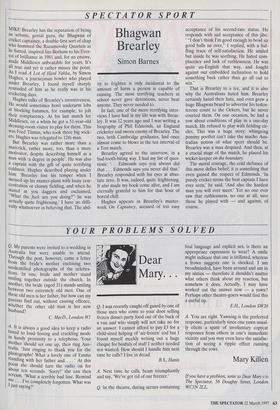SPECTATOR SPORT
MIKE Brearley has the reputation of being an urbane, genial guru, the Bhagwan of cricket captaincy, a double-first sort of chap who hummed the Razumovsky Quartets as he batted, inspired Ian Botham to his Ever- est of brilliance in 1981 and, for an encore, made Middlesex unbeatable for years. It's all true and yet it rather misses the point. As I read A Lot of Hard Yakka, by Simon Hughes, a journeyman bowler who played under Brearley, I found myself sharply reminded of him as he really was in his cricketing days.
Hughes talks of Brearley's inventiveness. He would sometimes bowl underarm lobs at blocking batsmen, for example, to jolt their complacency. At his last match for Middlesex, on a whim he got a 51-year-old dressing
-room visitor to play for them. This
was Fred Titmus, who took three big wick- ets. Hughes was relegated to 12th man.
But Brearley was rather more than a maverick, rather more, too, than a mere motivator, despite describing himself as a man with `a degree in people'. He was also a captain with the gift of quite terrifying coldness. Hughes described playing under him: 'Brearley lost his temper when I messed up his master-plans with lousy con- centration or clumsy fielding, and when he stared at you daggers and exclaimed, What the fuck are you doing?" he was actually quite frightening.' I have no diffi- culty whatsoever in believing that. The abil-
Bhagwan Brearley
Simon Barnes
ity to frighten is only incidental to the amount of harm a person is capable of causing. The most terrifying teachers at school never gave detentions, never beat anyone. They never needed to. In fact, one of the more terrifying inter- views I have had in my life was with Brear- ley. It was 12 years ago and I was writing a biography of Phil Edmonds, an England cricketer and sworn enemy of Brearley. The two, both Cambridge graduates, had once almost come to blows in the tea interval of a Test match.
Brearley agreed to the interview, in a bad-tooth-biting way. I had my list of ques- tions: ‘. . Edmonds says you always did that . . . Edmonds says you never did that.' Brearley responded with his eyes at abso- lute zero. It was, indeed, quite frightening. It also made my book come alive, and I am eternally grateful to him for that hour of boreal chill.
Hughes appears in Brearley's master- work On Captaincy, accused of too easy acceptance of his second-rate status. He responds with sad acceptance of this jibe. ` "I don't think I'm good enough to bowl six good balls an over," I replied, with a baf- fling trace of self-satisfaction. He smiled but inside he was seething. He hated com- placency and lack of ruthlessness. He was quite un-English that way, and fought against our embedded inclination to hold something back rather than go all out to win.'
That is Brearley to a tee, and it is also why the Australians hated him. Brearley certainly hated their hate, and even grew a huge Bhagwan beard to advertise his testos- terone count to the Ockers, but he never courted them. On one occasion, he had a row about conditions of play in a one-day match. He refused to play with fielding cir- cles. This was a huge story: whingeing pommy poofter can't take the macho Aus- tralian notion of what sport should be. Brearley was a man despised. And then, at a crucial stage of the match, he placed his wicket-keeper on the boundary.
The moral courage, the cold defiance of this move defies belief; it is something that even gained the respect of Edmonds. 'In purely cricket terms the best captain I have ever seen,' he said. `And also the hardest man you will ever meet.' Yet no one ever saw that ruthlessness, no one at all, save those he played with — and against, of course.


































































 Previous page
Previous page